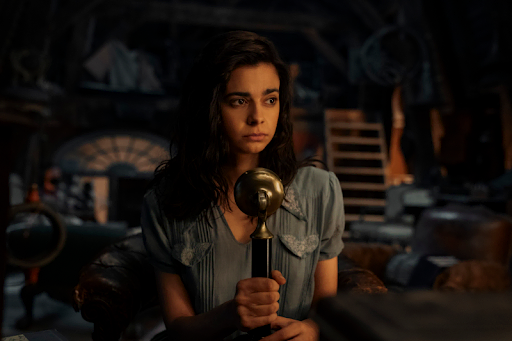Source: Deadline
When people think of film festivals, they tend to think of films that are expected to and will hopefully receive a major release on the big screen. After all, most of the films chosen for a given festival will likely be exhibited in one of the several theatrical venues selected to be used for said festival, and many filmmakers who submit their work do so under the assumption that, if they are successful enough, people will be see what they’ve created on the largest possible screen. In recent years however, theaters have started to lose their status as the only desirable means in which a film can be accessed by the public. Streaming services like Netflix and Amazon Prime have made the idea of watching a film from the comfort of one’s home whenever they choose increasingly appealing and feasible, and with the profits they’ve generated from this particular business model, such services have been able to purchase the distribution rights to various major motion picture releases and make them available only through streaming instead of in theaters. In addition, television series have also begun to gain a degree of artistic quality that had previously been unseen in past generations, perhaps in part because streaming has made the line between film and television so blurry that it’s become possible to make one or the other but create a similar visual aesthetic that could easily fit either.
This is where the Primetime program of the upcoming Toronto International Film Festival (TIFF) comes into play. Rather than simply just show singular feature films, as will be the case elsewhere in the festival (currently set to take place between Thursday, September 7th and Sunday, September 17th), the Primetime program will showcase excerpts of various international television programs that are either set to be released some time in the near future or are seeking a major distributor to release them. The idea of something meant for the small screen being exhibited on the big screen might have seemed unthinkable even a decade ago, but as the Primetime program proves, many television series have aimed for a cinematic quality that had been all but unachievable in the years prior, so much so that their artistic merits have proved respectable enough to be seen on a screen much larger than what most would have anticipated.
According to TIFF Creative Programming Officer Anita Lee, this year’s Primetime lineup is one of the best to be offered in the history of the festival, one that she sees as a stellar representation of serialized visual storytelling on a global scale. “This year’s Primetime programme is bigger than ever and gives audiences the exclusive and unmatched opportunity to celebrate the best new international series together, in cinema, on the big screen,” Lee states, claiming that those featured as part of the program will highlight “underrepresented voices from an exciting new wave of storytellers.”
One of the most high-profile series set to make their world premiere at this year’s Toronto International Film Festival is “All the Light We Cannot See”, a Netflix miniseries developed and written by Steven Knight and directed by Shawn Levy. Based on the Pulitzer Prize winning novel by Anthony Doerr, the four-part series takes place in occupied France at the height of World War II and follows two teenagers – the blind French girl Marie-Laure LeBlanc (played by Aria Mia Loberti) and the German boy Werner Pfennig (played by Louis Hoffman) who come together to combat the rising Nazi regime. Before its public release on Netflix on November 2nd, “All the Light We Cannot See” will shine on the big screen at one of TIFF’s various theatrical venues, giving its audience an opportunity to see this historical drama in a way they may not have access to otherwise.
Also set to make its world premiere at this year’s Toronto festival is “Bad Boy”, an Israeli series from the creators of the teen drama series “Euphoria” (which was later adapted into a popular American series for HBO). A collaboration between Peter Chernin’s North Road Co. and the Sipur production banner, the series, developed by creator Ron Lesham and directed by Hagar Ben-Asher, the series revolves around a man who, during his youth, was held at a juvenile detention center and developed a friendship with a most unusual stranger there. In the years since, the now fully-grown man is a popular comedian who seeks to keep his past as a prison youth a secret, one he struggles to keep as his old “friend” reappears in his life.
Perhaps just as highly anticipated as (if not more so than) the aforementioned series “Expats”, the follow-up creation of Lulu Wang, who had previously made a name for herself with her highly acclaimed 2019 comedy-drama “The Farewell”. With this latest directorial effort, a series currently set for a release on the Amazon Prime streaming service, Wang adapts Janice Y.K. Lee’s 2016 novel “The Expatriates” and tells the story of a expatriate community and the various personal dramas that occur among its affluent members, a cast of characters that features the likes of Nicole Kidman, Sarayu Blue, and Ji-young Yoo as just a small handful of its principal players. Apart from a 2021 short film titled “Nian”, Wang has not helmed a major production since releasing “The Farewell” over four years ago, so many will be quite eager to see what has come of her filmmaking talents in the time since.
These, of course, are only three of the nine series that will be included in this year’s TIFF Primetime program (the other six being “Alice and Jack” from the United Kingdom, “Bargain” from South Korea, the Finland/Sweden/Belgium/Estonia co-production “Estonia”, and the Canadian series “Black Life: Untold Series”, Brie Mack Gets a Life”, and “Telling Our Story”). It’s hard to believe that film festivals have changed so much over the past couple years that these television series have been permitted to make their debuts on the big screen, but it does make for a decent reminder of how the rise of streaming have brought the worlds of cinema and television closer together than ever before.




